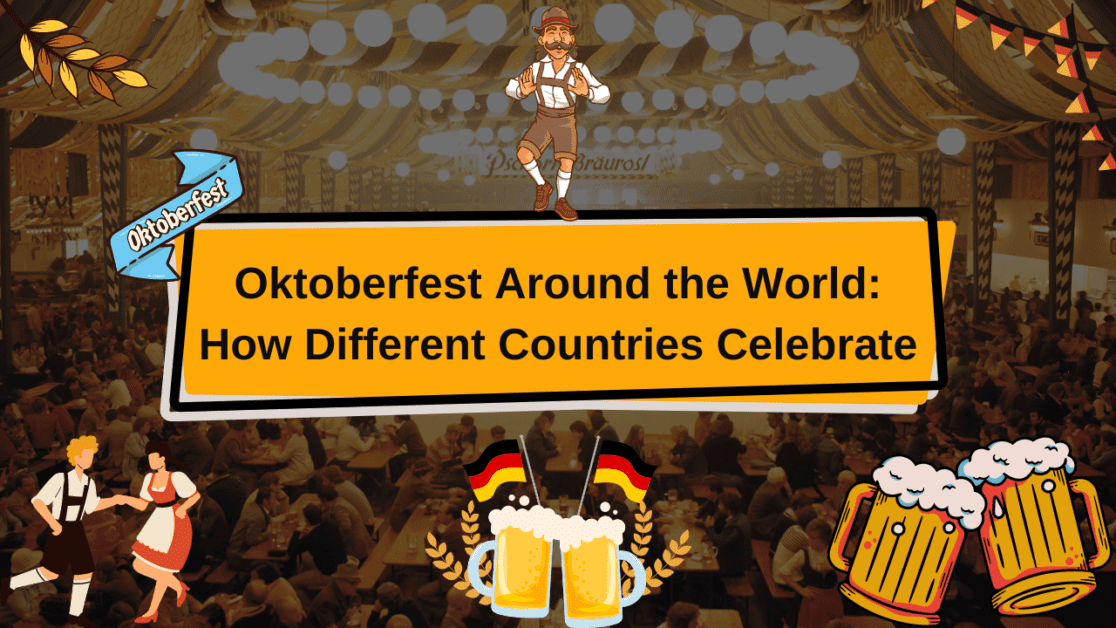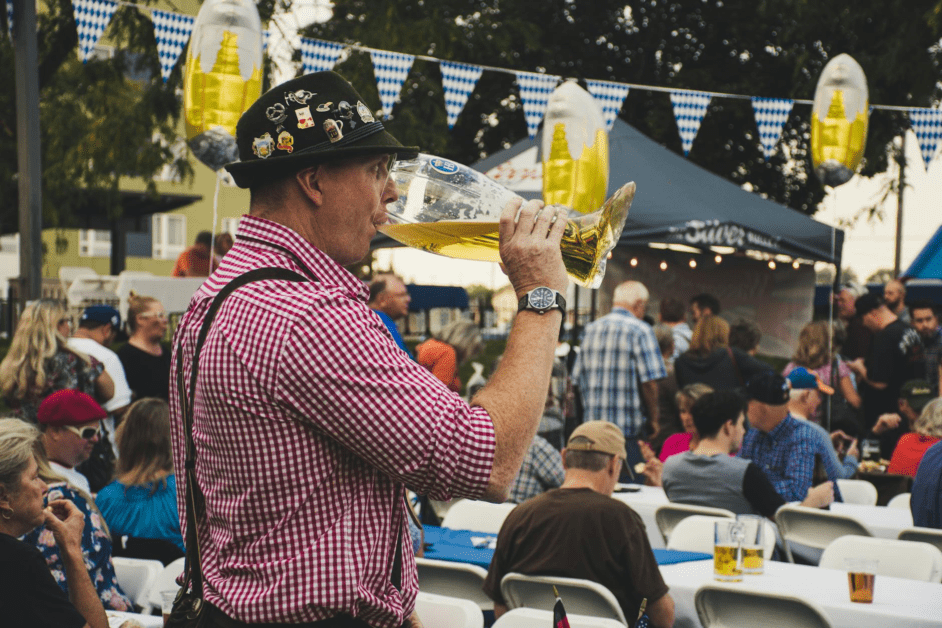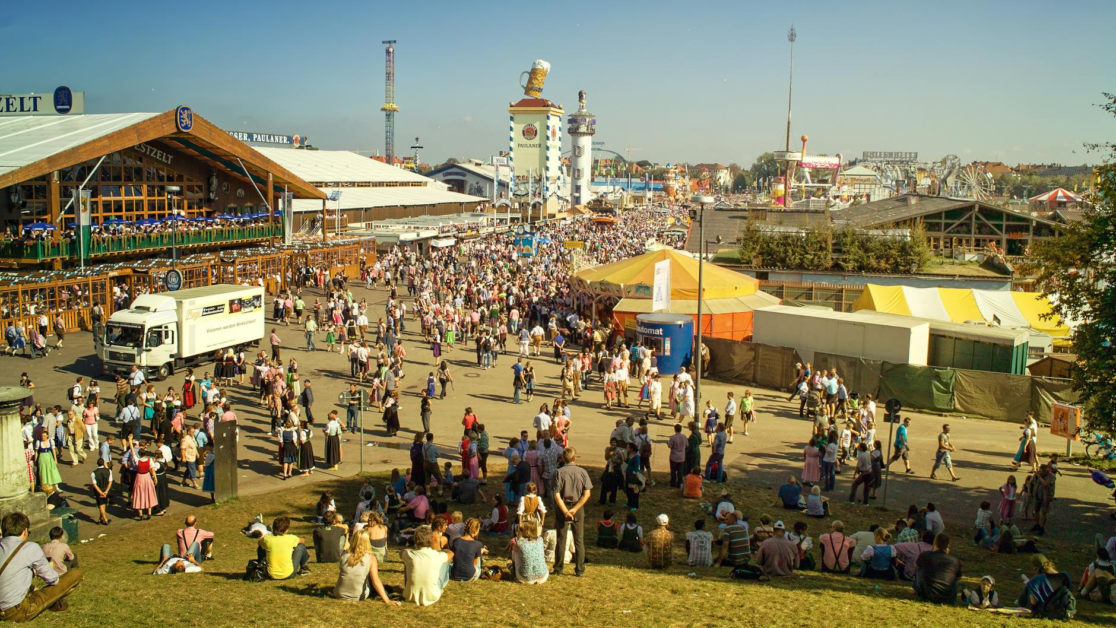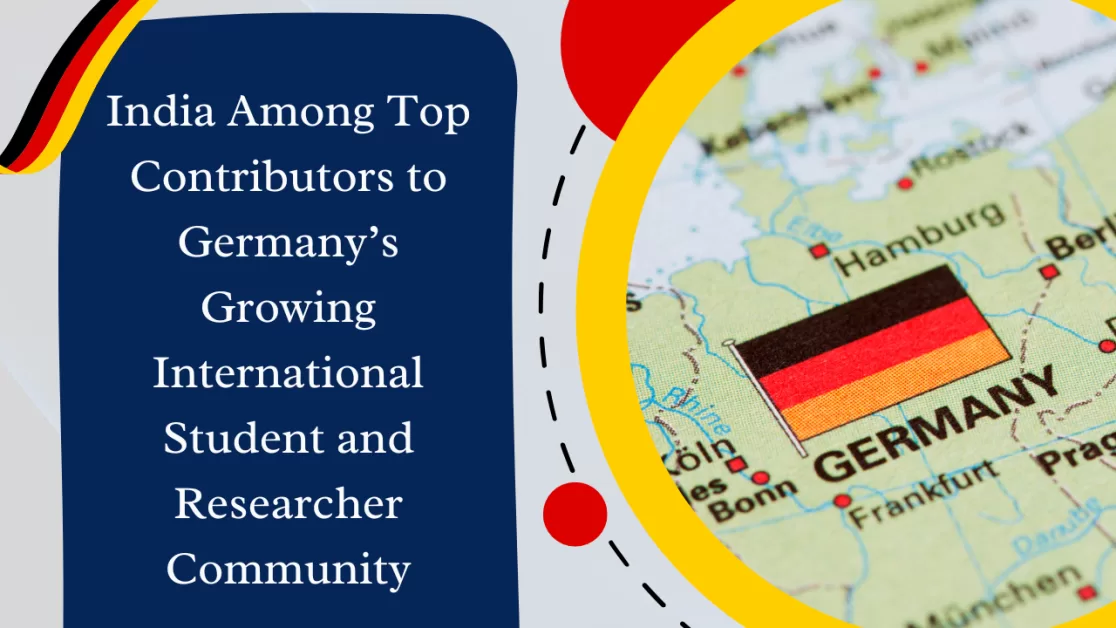
Raise your steins and don your dirndls! 🍻 Oktoberfest, the world’s largest folk festival, has transcended its Bavarian roots to become a global phenomenon. What began as a modest wedding celebration in Munich over two centuries ago has evolved into a beloved tradition that spans continents, cultures, and cuisines.
From the bustling beer gardens of Germany to the sun-soaked beaches of Brazil, Oktoberfest has been embraced and reinvented by revelers worldwide. Each country adds its unique flair to the festivities, creating a tapestry of celebrations that both honor the original Bavarian tradition and reflect local customs. But what makes these international Oktoberfests so captivating, and how do they compare to the original Munich extravaganza?
This exploration of Oktoberfest Around the World will delve into the festival’s rich history, examine how different countries have adapted the celebration, and uncover the key elements that unite these diverse interpretations. From the economic impact on host cities to the cultural significance of these events, join us as we embark on a global journey through the world of Oktoberfest celebrations.
Origins of Oktoberfest

A. The Munich tradition
Oktoberfest, the world’s largest folk festival, originated in Munich, Germany, in 1810. It began as a celebration of the marriage between Crown Prince Ludwig of Bavaria and Princess Therese of Saxony-Hildburghausen. The festivities included horse races, which were so popular that they became an annual event. Key elements of the original Munich Oktoberfest:- Horse races
- Agricultural shows
- Beer tents
- Traditional Bavarian food
B. Evolution of celebrations worldwide
As Oktoberfest gained popularity, it evolved from a local Bavarian tradition to a global phenomenon. The festival’s core elements remained consistent, but adaptations emerged to suit different cultures and tastes.| Decade | Notable Changes |
|---|---|
| 1800s | Introduction of beer tents and carnival attractions |
| 1900s | Expansion of festival grounds and increase in visitors |
| 1950s | International recognition and tourism boost |
| 2000s | Global spread and localized adaptations |
C. Spread to other countries
Oktoberfest’s popularity led to its adoption in various countries, each adding its unique cultural twist. German immigrants and beer enthusiasts played a significant role in spreading the tradition globally. Factors contributing to Oktoberfest’s international spread:- German diaspora communities
- Growing interest in German culture and cuisine
- Popularity of craft beer movements
- Tourism industry promotion
German-style Oktoberfest celebrations

While Oktoberfest originated in Munich, Germany, its spirit has spread across the globe. Many countries have embraced this Bavarian tradition, adapting it to their local cultures while maintaining key German elements. Let’s explore some of the most notable German-style Oktoberfest celebrations around the world.
Australia: Brisbane Oktoberfest
Brisbane’s Oktoberfest is the largest celebration of its kind in Australia. This event captures the essence of the German festival with:
Traditional Bavarian beer halls
Authentic German cuisine
Live oompah bands and yodelers
The festival also incorporates unique Australian touches, creating a blend of Bavarian and Aussie cultures.
Brazil: Blumenau Oktoberfest
Blumenau, a city with strong German heritage, hosts the largest Oktoberfest celebration in South America. Key features include:
18 days of festivities
German-Brazilian fusion cuisine
Parades showcasing traditional German costumes
Aspect | German Influence | Brazilian Twist |
|---|---|---|
Music | Oompah bands | Samba performances |
Food | Bratwurst, pretzels | Feijoada, coxinha |
Drinks | German beers | Caipirinha beer cocktails |
Canada: Kitchener-Waterloo Oktoberfest
Known as Canada’s Greatest Bavarian Festival, the Kitchener-Waterloo Oktoberfest is the largest Oktoberfest celebration outside of Germany. Highlights include:
Nine-day festival
Over 40 family and cultural events
Thanksgiving Day Parade
United States: Zinzinnati and other major events
The United States boasts numerous Oktoberfest celebrations, with Cincinnati’s Zinzinnati being one of the largest. American Oktoberfest events often feature:
Craft beer tastings alongside traditional German brews
German-American fusion food
Cultural activities like dachshund races and stein-holding contests
These international celebrations demonstrate how Oktoberfest has become a global phenomenon, blending German traditions with local customs and creating unique cultural experiences around the world.
Unique adaptations around the globe
As Oktoberfest’s popularity has spread beyond Germany’s borders, countries worldwide have embraced the festival, infusing it with their own cultural flavors. Let’s explore some of the most interesting international adaptations of this beloved beer celebration.
A. Vietnam: Hanoi Oktoberfest
Hanoi’s Oktoberfest brings a taste of Bavaria to Southeast Asia. This unique celebration blends German traditions with Vietnamese hospitality, creating a one-of-a-kind experience. Visitors can enjoy:
Authentic German beers
Traditional Bavarian cuisine with a Vietnamese twist
Live music featuring both German and Vietnamese performers
Cultural exchange activities
B. Argentina: Villa General Belgrano’s National Beer Festival
Villa General Belgrano, a town with strong German roots, hosts Argentina’s largest Oktoberfest celebration. This festival showcases:
Local craft beers alongside German imports
Traditional Argentine asado (barbecue) alongside German sausages
Folk dancing competitions featuring both German and Argentine styles
Unique beer-themed attractions, such as beer yoga classes
C. India: Bangalore Oktoberfest
Bangalore’s Oktoberfest offers a fascinating fusion of Indian and German cultures. This vibrant event features:
A mix of German beers and Indian craft brews
Indo-German fusion cuisine
Bollywood-meets-Bavaria entertainment
Traditional Indian art and craft exhibitions
D. Japan: Yokohama Oktoberfest
Yokohama’s Oktoberfest is one of the largest in Asia, seamlessly blending German traditions with Japanese precision and hospitality. Highlights include:
An extensive selection of German and Japanese craft beers
Fusion dishes combining German and Japanese flavors
Cosplay contests featuring dirndls and lederhosen with anime-inspired twists
Traditional Japanese performances alongside Bavarian music
Country | Unique Feature | Local Twist |
|---|---|---|
Vietnam | Southeast Asian flair | Vietnamese-German fusion cuisine |
Argentina | Strong German heritage | Asado meets bratwurst |
India | Bollywood-inspired entertainment | Indo-German fusion dishes |
Japan | Anime-inspired costume contests | Japanese-German beer and food pairings |
These international Oktoberfest celebrations demonstrate how a traditional German festival has been embraced and adapted worldwide, creating unique cultural experiences that bridge nations and traditions.
Key elements of international Oktoberfest celebrations
International Oktoberfest celebrations blend traditional German elements with local cultural influences, creating unique and vibrant events worldwide. These festivals share several key components that capture the spirit of the original Bavarian celebration while incorporating distinctive regional touches.
A. Cultural fusion elements
Oktoberfest celebrations around the globe often feature a fascinating mix of German traditions and local customs. This cultural fusion is evident in:- Decorations: Combining traditional Bavarian blue and white with local color schemes
- Entertainment: Mixing German oompah bands with local musical acts
- Food offerings: Blending German classics with regional specialties
B. Games and activities
Oktoberfest events typically include a variety of games and activities that appeal to all ages:- Beer stein holding contests
- Sausage eating competitions
- Barrel rolling races
- Traditional German carnival games
- Local cultural performances
C. Costumes and attire
Attendees often dress in traditional German attire or local interpretations:| German Attire | Local Adaptations |
|---|---|
| Dirndls | Fusion dresses |
| Lederhosen | Themed t-shirts |
| Bavarian hats | Local headwear |
D. Folk music and dances
Music and dance play a crucial role in Oktoberfest celebrations:- German folk bands performing traditional songs
- Local musicians offering regional favorites
- Dance floors for the Chicken Dance and polka
- Fusion performances blending German and local dance styles
E. Traditional German beer and food
No Oktoberfest is complete without authentic German cuisine and beverages:- Märzen-style beers served in traditional steins
- Bratwurst, sauerkraut, and pretzels
- Schnitzel and potato salad
- Local interpretations of German dishes using regional ingredients
Economic and cultural impact
The global celebration of Oktoberfest extends far beyond its Bavarian roots, creating significant economic and cultural ripples across the world. This phenomenon has become a catalyst for cross-cultural exchange, local business growth, and tourism development in many countries.
Cross-cultural exchange
Oktoberfest celebrations serve as a unique platform for cultural exchange, bringing together people from diverse backgrounds to experience German traditions. This intercultural mingling fosters understanding and appreciation of different customs, creating a bridge between cultures.
Local business opportunities
The adoption of Oktoberfest by various countries has opened up numerous business opportunities for local entrepreneurs. From breweries to food vendors and souvenir shops, many businesses benefit from the influx of visitors during these festivities.
Business Type | Opportunity |
|---|---|
Breweries | Showcase local and German-style beers |
Food vendors | Offer traditional German cuisine and local specialties |
Souvenir shops | Sell Oktoberfest-themed merchandise |
Event planners | Organize and manage Oktoberfest celebrations |
Promotion of German culture
International Oktoberfest celebrations act as ambassadors for German culture, introducing elements of Bavarian traditions to a global audience. This cultural promotion includes:
Traditional German music and dance
Authentic Bavarian cuisine
German language exposure
Showcasing German craftsmanship through beer steins and traditional clothing
Tourism boost for host cities
Cities hosting Oktoberfest events often experience a significant increase in tourism during the celebration period. This influx of visitors brings numerous benefits:
Increased hotel occupancy rates
Higher revenue for local restaurants and bars
Boost in transportation services usage
Enhanced global visibility for the host city
The economic and cultural impact of Oktoberfest celebrations around the world demonstrates how a single cultural event can transcend borders, fostering international connections and driving local economies. As these festivities continue to grow in popularity, their influence on global cultural exchange and economic development is likely to expand further.
Conclusion

The global spread of Oktoberfest celebrations demonstrates the universal appeal of this Bavarian tradition. From its humble beginnings in Munich to its current status as a worldwide phenomenon, Oktoberfest has evolved into a diverse cultural experience that transcends borders. While German-style celebrations remain popular, many countries have adapted the festival to reflect their own unique customs and tastes, creating a rich tapestry of international interpretations.
Despite these variations, certain key elements remain constant across Oktoberfest celebrations worldwide. The emphasis on beer, traditional food, music, and festive atmosphere continues to draw millions of participants annually. Beyond the revelry, these events have significant economic and cultural impacts, fostering tourism, promoting cultural exchange, and strengthening community bonds. As Oktoberfest continues to grow in popularity, it serves as a testament to the enduring power of shared celebrations and the joy of coming together in the spirit of gemütlichkeit.
Ready to explore? Start your visa application today and get one step closer to your adventure!
Don’t let uncertainties hold you back. Our team of expert overseas education consultants is readily available to assist you. Whether you have inquiries about:
Specific document requirements
Interview preparation tips
Visa application timelines
We’re ready to provide personalized guidance tailored to your unique situation. Get in Touch Today at: +919041818122 and begin your journey with Vrinda International.
The information provided in this blog is for general guidance purposes only. Visa policies, application procedures, and fees are subject to change without prior notice. For the most accurate and up-to-date details, we recommend contacting us directly or consulting official sources. Feel free to reach out to us for personalized assistance with your visa application or travel needs.
FAQ - Frequently Asked Question
1. What is Oktoberfest, and how did it originate?
Oktoberfest is a traditional Bavarian festival that originated in Munich, Germany, in 1810, celebrating the wedding of Crown Prince Ludwig and Princess Therese. Over time, it evolved into the world’s largest beer festival, featuring traditional music, food, and cultural festivities.
2. Which countries outside Germany celebrate Oktoberfest?
Oktoberfest is celebrated in many countries worldwide, including the USA, Canada, Australia, Brazil, Japan, and India. Each country adds its unique flavor to the event while maintaining the core traditions of Bavarian culture.
3. How is Oktoberfest celebrated differently in the USA?
In the USA, cities like Cincinnati, Ohio, and Milwaukee, Wisconsin, host some of the largest Oktoberfest celebrations. These events feature local craft beers, live music, parades, and even dachshund races, blending American and Bavarian traditions.
4. What makes Oktoberfest in Brazil unique?
Brazil’s Oktoberfest, especially in the city of Blumenau, is the second-largest in the world. The celebration includes a fusion of Brazilian and German culture, with traditional German bands, dance performances, and a variety of local Brazilian and German beers.
5. Are there any special traditions for Oktoberfest in Japan?
In Japan, Oktoberfest celebrations often take place in major cities like Tokyo and Yokohama. The festival is characterized by authentic German beer and food, along with a unique Japanese twist, such as anime-themed performances and locally brewed craft beers.
6. How is Oktoberfest celebrated in Australia?
Australia hosts Oktoberfest events in cities like Sydney, Melbourne, and Brisbane, featuring traditional German beers, food, and music. Some events also incorporate Australian elements, such as local craft beers and activities like ‘best dressed’ competitions.
7. Do countries with different drinking cultures participate in Oktoberfest?
Yes, countries with varying drinking cultures, like India and the UAE, celebrate Oktoberfest with a focus on food, music, and non-alcoholic beverages. These events offer a chance to experience Bavarian traditions without alcohol, respecting local customs.
8. What foods are typically served at Oktoberfest celebrations around the world?
Traditional German foods like pretzels, bratwurst, schnitzel, and sauerkraut are staples at Oktoberfest events globally. Many countries also incorporate local cuisines, offering a diverse menu that reflects both Bavarian and regional flavors.
9. How can I participate in Oktoberfest if I can’t travel to Munich?
Many cities around the world host Oktoberfest events, so you can likely find one near you. Additionally, you can create your own Oktoberfest experience at home by enjoying German beers, cooking traditional foods, and playing Bavarian music.
10. Why is Oktoberfest celebrated outside of Germany?
Oktoberfest has become a global phenomenon due to the worldwide appreciation of German culture, beer, and traditions. It offers an opportunity for people to connect, celebrate, and experience a taste of Bavaria, no matter where they are.



